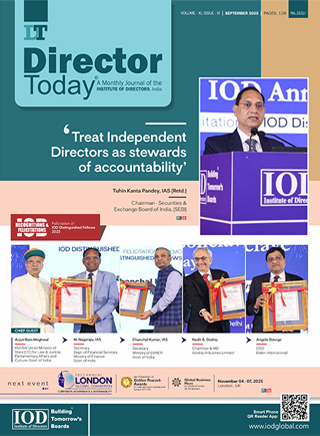Corporate Governance in Maldives
By- Institute of Directors | Authored by- Ms. Ayesha Nurain Janah | Ms. Ibthishama Ahmed Saeed
Nov 05, 2024

Beyond Tourism: Corporate Governance as the Next Frontier for the Maldivian Economy
Insights from the Institute of Directors, Maldives
As the global business landscape evolves, the Maldives is experiencing significant transformations in corporate governance practices. The island nation's reliance on tourism, vulnerability to climate change, and increasing integration with the global economy present unique challenges and opportunities. In 2024, corporate directors in the Maldives are starting to prioritise effective governance as a means to foster sustainable economic growth, particularly within the private sector.
While corporate governance has been codified for the public sector through the Capital Market Development Authority's '2008 Corporate Governance Code' for listed entities and the Code of Corporate Governance for State-Owned Enterprises, the private sector still grapples with understanding its implications and benefits. The concept of corporate governance remains underdeveloped, limiting its effectiveness in driving organisational excellence.
Tourism remains the backbone of the Maldivian economy, with a reported 10.5% year-on year increase in tourist arrivals by August 2024. However, the country faces economic pressures, including a drop in consumer price inflation to 0.5% in the first half of 2024 and a sharp rise in food inflation to 6.7%. Furthermore, the Maldives has faced downgrades by credit rating agencies, underscoring the need for the nation to elevate its standards in the private sector to attract foreign investment, despite increasing competition.
Key priorities for corporate directors in the Maldives include strict adherence to local laws and international regulations, particularly concerning financial reporting, labor laws, and environmental standards. It is imperative to establish best practices in corporate governance through tried-and-tested frameworks, especially within the tourism sector, where understanding existing gaps is critical. These frameworks must promote transparency and ethical behaviour, both internally and with all stakeholders, ensuring alignment with global standards.
Key priorities for corporate directors in the Maldives include strict adherence to local laws and international regulations, particularly concerning financial reporting, labor laws, and environmental standards.
Regulatory compliance is a top concern for corporate directors, as adherence to financial reporting standards, tax regulations, and intersecting laws, such as labor laws, is crucial. However, while many nations are adopting comprehensive frameworks that address issues such as modern slavery and ethical supply chains, the Maldives remains focused primarily on compliance. This narrow perspective hinders the potential for leveraging corporate governance as a driver of innovation and sustainability.
The impending introduction of the new Companies Act in December 2024 marks a critical juncture for corporate governance in the Maldives. The Act will permit private companies to appoint independent directors, abolishing the previous requirement for directors to be shareholders. Additionally, it will delineate directors' duties, necessitating adherence to a “reasonable person” standard of skill and care—often referred to as fiduciary duties. These duties will include acting in the company's best interest, disclosing conflicts of interest, and upholding confidentiality.
In light of these developments, the Institute of Directors Maldives (IOD Maldives) was established in August 2024. As an independent non-profit association, the IOD aims to enhance corporate governance skills and knowledge among directors, advisors, young professionals, and academics. The IOD serves as a collaborative platform for all stakeholders in the corporate governance ecosystem to elevate standards and share knowledge.
The IOD Maldives envisions itself as the nation's hub for corporate governance, bringing together local directors and global experts to promote best practices. Through innovative programs, networking opportunities, and strategic insights, the IOD empowers directors and executives to navigate contemporary business challenges while fostering a robust network that strengthens Maldivian businesses and communities.
In an increasingly volatile, uncertain, complex, and ambiguous (VUCA) world, corporate directors must navigate myriad challenges while implementing robust governance frameworks aligned with global standards. This approach will enhance confidence in the local economy among foreign investors and cultivate trust and transparency in the broader international market. Directors are beginning to prioritise risk management, including securing insurance against specific risks and developing strategies for business resilience, particularly in tourism and other economic sectors that drive growth.
Moreover, stakeholder engagement is essential for corporate success. Building strong relationships with investors, employees, and local communities is critical to ensuring corporate governance practices align with the interests of those affected by business decisions. Fostering a culture of ethical, transparent, and accountable business practices is increasingly expected not only by foreign investors but also by the younger generation in the Maldives.
Diversity within the boardroom is another crucial component of effective corporate governance. Embracing diverse perspectives-across backgrounds, gender, and age can lead to more innovative and effective decision-making processes. Best practices should include assuring board diversity, implementing succession planning, and providing regular training and development programs for talent management. Moreover, clearly defined objectives for directors, management, and committees, along with regular performance assessments, are necessary to ensure a focus on long-term strategy and sustainability rather than short-term financial performance.
As the Maldives navigates the complexities of a rapidly changing global economy, boardroom trends are shifting towards greater emphasis on environmental, social, and governance (ESG) considerations, digital transformation, and adaptability. The implications of global trade dynamics and geopolitical tensions require corporate directors to adjust their risk management strategies through agile practices that enable quick responses to unexpected changes.
The future of governance will likely feature more remote and hybrid models, leveraging digital tools to enhance collaboration and decision-making processes. Embracing technology to improve operational efficiency and enhance customer experiences is paramount, especially as the Maldives confronts challenges in attracting, developing, and retaining skilled employees in a competitive market. Additionally, corporate directors must prepare for and respond to crises, such as natural disasters or economic downturns, which can significantly impact the business landscape.
In closing, as the Maldives is navigating the challenges of a rapidly changing global economy, corporate governance will play a pivotal role in shaping the future of its private sector. By embracing global standards for good corporate governance practices through IOD Maldives as a professional body of corporate directors sharing knowledge across borders to enhance corporate governance, the Maldives can position itself as an attractive destination for investment while ensuring sustainable economic growth for generations to come.
Authors
Ms. Ibthishama Ahmed Saeed
Vice Chair, Institute of Directors, Maldives, and Managing Director and CEO Maldives Finance Leasing Corporation (MFLC)
Ms. Ayesha Nurain Janah
Chair, Institute of Directors, Maldives, and Group Vice-Chair at Hotels and Resorts Investments Maldives (HARIM)
Owned by: Institute of Directors, India
Disclaimer: The opinions expressed in the articles/ stories are the personal opinions of the author. IOD/ Editor is not responsible for the accuracy, completeness, suitability, or validity of any information in those articles. The information, facts or opinions expressed in the articles/ speeches do not reflect the views of IOD/ Editor and IOD/ Editor does not assume any responsibility or liability for the same.

 Quick Links
Quick Links
 Connect us
Connect us




 Back to Home
Back to Home































